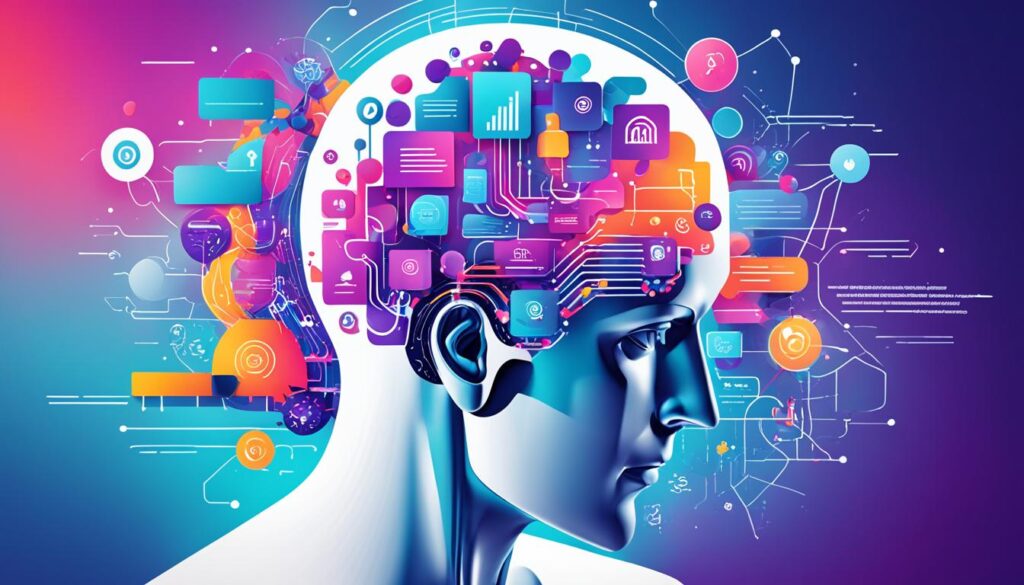“The future belongs to those who prepare for it today.” – Malcolm X
Artificial Intelligence (AI) is reshaping marketing today. It paves the way for smarter, more successful marketing efforts. Robert Gillespie, an AI marketing expert, has developed programs to help marketers use AI effectively. Through The AI Marketing Agency, Gillespie shows how AI can power strategic marketing.
AI assists as a creative partner, brainstorming ideas, speeding up testing, and analyzing results quickly. This is key to adapting and thriving in the fast-paced market of today.
Gillespie introduces a method called “AI Marketing: Knowledge Stacking.” This technique turns strategic content into practical assets, making work more efficient. It highlights how AI can improve productivity and help with smart decision-making. This is beneficial for businesses new to AI marketing.
Key Takeaways
- AI-powered predictive analytics helps businesses make informed decisions by forecasting sales and identifying customer behavior patterns.
- NLP technologies enable personalized customer support and targeted marketing messages, enhancing customer interactions.
- Image recognition AI improves product discovery and ad targeting, creating better visual experiences for customers.
- AI-driven personalization boosts customer engagement and loyalty by tailoring marketing messages to individual preferences.
- Businesses leveraging AI marketing see benefits like improved customer satisfaction, relationships, and brand advocacy.
- Insights from customer data can create personalized content and optimize content marketing and SEO activities.
- AI marketing automation streamlines processes, enhancing productivity and facilitating better decision-making.
The Importance of AI in Modern Marketing
AI is now a key player in marketing. It may impact close to 40% of jobs worldwide, says Bloomberg. Looking at ai implementation in marketing, AI is a huge technological milestone following the internet and mobile. It reshapes how customers see things through predictive AI, content creation AI, and engagement AI.
AI excels at understanding what customers feel. It does this using social media to analyze sentiment, checking millions of points quickly. AI tools can pick out important info from social media, giving us better insights into what people want.
For those new to AI, tools like what Sprout offers have gotten really advanced. These AI-driven platforms help make engaging content and targeted campaigns. They boost brand presence and connect with more people using machine learning and understanding language precisely.
Moreover, AI for beginners benefits as machine learning models get smarter over time. They learn from more data, enhancing their performance. Using natural language processing, these tools get a better grip on social media conversations, even understanding slang and emojis.
Semantic search and named entity recognition (NER) are vital in AI marketing. They sort keywords and spot key figures, even with typos. So, AI helps shape your campaign’s strategy, making ads more targeted and content more personal.
- Predictive AI learns from what behaviors and trends show to tailor customer experiences.
- Content creation AI makes marketing materials more personal, without manual effort.
- Engagement AI makes communication better and strengthens bonds with customers.
AI in marketing is more than just being efficient. Neural networks make machine learning more accurate as time goes on. This makes AI tools invaluable for creating powerful, insight-driven marketing approaches.
AI Marketing: Knowledge Stacking Process
Robert Gillespie developed a new way to start using AI in marketing strategies. It’s called the “AI Marketing: Knowledge Stacking” process. This process uses tools like Google Gemini Advanced. These tools turn a main marketing idea, the “Strategic Narrative,” into various helpful marketing pieces. It makes starting with AI for digital marketing efficient and effective.
- Strategic Narrative Development: Using AI, the main content is made. It’s based on the company’s big marketing plan. This ensures the content is relevant and precise.
- Transformation into Tactical Assets: From there, the story is spread into different materials. These include sales and marketing presentations and website layouts.
- Idea Generation and Content Creation: AI helps marketers quickly come up with ideas and make content. This content fits specific channels and audiences. This is a key tip for beginners in AI marketing.
Data shows 64% of marketing pros use AI tools somehow. Yet, only 21% have fully added AI into their work. The Knowledge Stacking method could improve these stats a lot. This method believes AI can make content more personal and relevant. As a result, 71% of marketers using AI say it makes customer experience better.
The Knowledge Stacking method shows how AI can automate making and changing content on many platforms. This saves marketers more than two hours every day. For those new to AI in digital marketing, it gives them the structure and tools needed. This way, they can make their strategies better quickly.
When it comes to using AI in marketing, 40% of marketers focus on data analysis. This is followed by research (39%), and making content (38%). Using insights from AI helps marketers predict results better. They can keep improving their plans and get a higher return on investment.
To wrap it up, the AI Marketing: Knowledge Stacking process is a strong, smart way to use AI. It provides a solid start for using AI in marketing strategies. This method ensures making content and adapting strategies stay fast and focused. These qualities are crucial in the quick-moving world of digital marketing today.
Using this approach helps with starting in AI for digital marketing. It also enables marketers to create consistent, high-quality content. This content hits home with their audience. It boosts engagement and leads to success.
Strategic Use of AI Tools for Rapid Business Launch
Adding AI to your marketing can make business launches faster and more creative. By using suitable AI tools for beginners, you streamline marketing development. This ensures innovative ideas become real, workable plans.
Generating Ideas & Content
AI’s big plus is its fast idea and content creation. A study shows that 64% of marketers use AI tools like Google Gemini Advanced for this. These tools are great for making engaging ads, website text, and email chains fast. With AI, marketing stories stay fresh and interesting.
Testing and Gathering Feedback
AI becomes super helpful in the launch stage for feedback. It quickly collects data from different places for fast tweaks and better results. Only 21% of marketers use AI daily, yet it cuts down market testing and feedback times a lot.
Analytics and Optimization
AI is excellent at analyzing and improving marketing work. 40% of marketers use it to sift through data. It helps tweak campaigns with up-to-date data and future guesses, saving hours each day. Plus, AI helps make shopping personal, which 71% of marketers think works well.
To sum up, using AI tools for beginners is key for starting, testing, and bettering marketing. Smart use of AI in marketing helps businesses launch smoothly. This opens the door for ongoing success and impact.
Best AI Marketing Tips for Beginners
Starting with AI in marketing means beginning small, scaling up slowly, and constantly learning. Here are vital tips to help beginners use AI well in marketing.

Start Small and Scale
When starting with AI for marketing, focus on small projects. You could use AI for analyzing data or creating content. About 40% of digital marketing that uses AI focuses on analyzing data. This gives important insights without using too many resources.
Starting with a small project makes it easier to implement and scale up later. As you become more skilled, you can increase your AI efforts confidently.
Invest in Training and Education
AI marketing tools are powerful, requiring proper knowledge to use them fully. Educating yourself about these tools helps you make the most of them. Sadly, only 21% of marketers fully integrate AI tools into their routines, showing many don’t use AI to its fullest potential.
Investing in training helps close this knowledge gap. It turns AI into a key part of your marketing strategy. Workshops, webinars, and courses are great for staying current with new developments and best practices.
Employ AI for Content Personalization
AI’s big strength in marketing is how it personalizes content for each user. Using AI for this purpose boosts engagement and makes messages more relevant to each user. It significantly improves the user experience.
Statistics indicate that 71% of marketers believe AI greatly improves content personalization. AI saves marketers over three hours per content piece. This frees up more time for strategic work, making teams more efficient.
| Top AI Marketing Uses | Percentage |
|---|---|
| Data Analysis/Reporting | 40% |
| Research | 39% |
| Content Creation | 38% |
These AI marketing tips for beginners make stepping into AI-driven marketing easier. They also build a solid foundation for future growth and personalized marketing strategies.
How to Get Started with AI for Marketing
Starting with AI in your marketing means knowing your goals first. You need to choose AI tools that match your marketing needs. It’s important to learn early and set a clear path. Find which AI tools fit well with your tech and team. This ensures everyone can learn and use these tools effectively.
Currently, only 21% of marketers use AI a lot in their work. This shows a big chance for better results and saving time. Start with learning and assessing what AI can do for you. This helps find the right AI tools for your needs.
Looking at how AI can do routine tasks is a key step. AI saves professionals an average of over two hours daily. Start small to see how AI can make things easier without adding too much complexity.
Then, research AI options that fit your chosen area. Look at different sources to understand these tools. Check out Pattern89 for ads, Grammarly for writing, and Drift for sales as some options.
Testing the chosen AI with your current systems is key. This makes sure the AI works as expected. Keeping track of how well it works is also crucial as you build your AI marketing plan.
To wrap up, beginning with AI takes careful planning. You start with learning, pick specific areas to improve, and test the AI. An AI marketing beginners guide can make your marketing better and more data-driven.
Essential AI Tools for Beginners
Understanding the right AI tools is crucial for beginners in digital marketing. These tools make workflows easier and boost marketing strategies. For new businesses in digital marketing, these AI tools are key to better campaigns.

Google Gemini Advanced
Google Gemini Advanced is a top pick for creating detailed marketing stories. It’s great for beginners needing to make content and assets for marketing. It helps make detailed marketing presentations and targeted sales emails, perfect for those new to AI in marketing.
AI Content Creation Tools
AI content creation tools are getting very important. Tools like Jasper AI, Writer.com, and Content at Scale automate making great content. Jasper AI is especially popular, with lots of glowing reviews.
These tools help beginners craft blogs, emails, and social media posts easily.
Analytics and Data Interpretation Tools
Analytics and data tools are vital for learning from the market and improving strategies. Surfer SEO and Originality AI are key tools in this area. Surfer SEO checks content for the right keywords and readability, while Originality AI checks for plagiarism.
These tools are a must-have for novices using AI marketing methods.
Building an Effective AI Marketing Strategy
Building a strong AI marketing strategy means using predictive AI and data wisely. It’s all about understanding each step of the customer’s journey. By doing this, we can make content more personal and place ads better.
Starting with AI marketing techniques for beginners can really boost engagement and conversions. Stats show that making things personal can increase revenue by 10% to 15%. Firms focusing on personalization might see a 40% rise in income.
AI helps by looking at how customers behave, predicting sales, and figuring out the best prices. This not only saves money but also makes customers happier and more loyal. For example, using AI in emails has increased clicks by 13.4% and revenue by 41.2%.
Using engagement AI, we keep up constant communication with customers. This uses AI’s strengths to make marketing campaigns better, helping with clicks, conversions, and lowering costs of acquiring customers.
AI can also automate tasks like finding leads and categorizing customers. This saves time and boosts efficiency. So, using AI in marketing makes things run smoother and helps companies be more data-focused, leading to innovation and growth.
AI tools like Salesforce Einstein, Acquisio, Marketo, Adobe Sensei, and Optimizely help create personalized messages and optimize ads. With 64% of marketers already using AI, it’s clear these tools are key in today’s marketing.
For AI-driven strategies to work, we need to look at our marketing methods, spot problems, and find the right AI solutions. Setting up, teaching, and expanding the use of AI tools helps keep up with customer needs and opens up new chances for making money.
Implementing AI in Digital Marketing Campaigns
Using AI in digital marketing shapes how we connect with customers. It lets us use tools for better speed and customization in marketing. This means more effective communication with our audience.

Email Marketing Automation
Starting with AI in email marketing is crucial. It lets us send personalized emails that really speak to people. AI helps us pick the right content and timing, making our messages more effective. This leads to higher open rates and more conversions.
AI-Powered Social Media Management
Managing social media with AI is key for beginners. It helps create and manage posts easily. With AI, we keep our social media lively and respond quickly to our audience. This keeps our brand strong and engaging.
Predictive Analytics for Targeted Campaigns
Predictive analytics are central to using AI in marketing. They predict what customers will do based on past actions. This helps us make our campaigns more accurate and effective.
Research shows 64% of marketers already use AI. They mostly use it for analyzing data, researching markets, and creating content. AI helps save over three hours per content piece, showing its value in marketing.
| AI Tool | Usage Percentage | Applications |
|---|---|---|
| Data Analysis/Reporting | 40% | Understanding market feedback, refining strategies |
| Market Research/Article Summarization | 39% | Summarizing large volumes of text, research insights |
| Content Creation | 38% | Generating textual and visual content |
AI for Customer Engagement and Personalization
Using AI can deeply improve how you engage and personalize for customers in marketing. It’s important to learn how to begin with AI in your strategy. AI shines in analyzing customer data to predict behaviors. Using AI for personalizing content lets companies give very tailored experiences to each customer.
Personalization can range from using the customer’s first name in emails to showing different products based on their web actions. The use of AI and ML in marketing tools, like CDPs, highlights the need for accurate, up-to-date customer data. This data helps create personalized experiences using AI insights.
A CDP on cloud data storage offers a complete view of customers, aiding better personalized marketing. AI helps in analyzing and predicting what customers might do next. This means we can deliver content that changes in real time across many platforms.
Gathering customer data in CDPs helps see customers in one view, improving data use and insights. CDPs’ ability to activate data instantly is key for guiding the customer journey. AI personalization offers many benefits like more customer activity, better sales, improved brand viewing, and smarter marketing spending.
Real-time engagement means using AI for instant personalized talks, like with chatbots and voice helpers. These tools are not just for experts. They work great for beginners too. As many as 71% of marketers who use AI say it’s critical for making customer experiences special.
Marketers find AI tools save a lot of time, boosting work productivity. This lets them focus more on personalized marketing. Employing AI strategically in content personalization helps build stronger customer ties. It gives businesses a much-needed edge in the competition.
The Future of AI in Marketing: Trends to Watch
The future of AI in marketing is heading for big growth. By 2028, the market could rise to over $107.5 billion from $15.84 billion in 2021. AI will play a bigger role in search optimization, improving customer experiences, and creative solutions.
About 60% of tech leaders increased their AI budgets by at least 10% in 2020. A third of them raised their budgets by 30%. This boost is due to the success of tools like Google Gemini Advanced and the popularity of voice assistants. Siri, Google, and Alexa might reach 157.1 million users by 2026. This shows how vital it is to know AI marketing, especially for beginners.
Predictive analytics is a growing trend. It helps companies forecast sales and understand customer behavior. AI makes marketing campaigns easier to manage. It also makes the content more personal for different parts of the audience. Better ad targeting lets us send messages that truly matter to people.
Generative AI tools are changing the marketing world, says Forbes. These tools make chatbots smarter, helping them talk more naturally with customers. With more people shopping by voice, marketers need to adjust their strategies. As AI ethics improve, practices in marketing will become more refined. Whether you’re new to AI marketing or looking for advanced techniques, keeping up with these trends is key.



